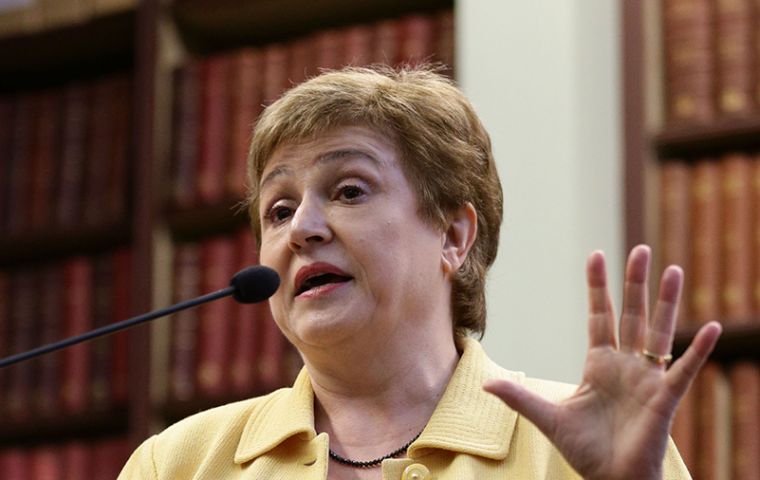MercoPress. South Atlantic News Agency
It's official: IMF says pandemic has driven the global economy into recession
 “It is clear that we have entered a recession” that will be worse than in 2009 following the global financial crisis, said IMF chief in an online press briefing.
“It is clear that we have entered a recession” that will be worse than in 2009 following the global financial crisis, said IMF chief in an online press briefing. The coronavirus pandemic has driven the global economy into a downturn that will require massive funding to help developing nations, IMF chief Kristalina Georgieva said on Friday.
“It is clear that we have entered a recession” that will be worse than in 2009 following the global financial crisis, she said in an online press briefing.
With the worldwide economic “sudden stop,” Georgieva said the fund's estimate “for the overall financial needs of emerging markets is US$2.5 trillion.” But she warned that estimate “is on the lower end.”
Governments in emerging markets, which have suffered an exodus of capital of more than US$83 billion in recent weeks, can cover much of that, but “clearly the domestic resources are insufficient” and many already have high debt loads.
Over 80 countries, mostly of low incomes, have already have requested emergency aid from the International Monetary Fund, she said.
“We do know that their own reserves and domestic resources will not be sufficient,” Georgieva said, adding that the fund is aiming to beef up its response “to do more, do it better, do it faster than ever before.”
She also welcomed the US$2.2 trillion economic package approved by the US Senate, saying “it is absolutely necessary to cushion the world's largest economy against an abrupt drop the economic activities.”
The US package also is important because it accelerated Washington's approximately US$16 billion contribution to the IMF's lending capacity. The fund membership in January approved a plan to double one of its funding baskets - the New Arrangements to Borrow - to about US$500 billion.
”The US decision to speed up approval of its substantial new contributions to the IMF is a powerful message to the international community and helps solidify the IMF's (overall) US$1 trillion lending capacity,” Georgieva said in a statement after the House of Representatives approved the massive rescue package.
The IMF chief spoke to reporters following a virtual meeting with the Washington-based lender's steering committee, when she also requested an increase in the fund's fast-deploying emergency facilities from their current level of around US$ 50 billion.




Top Comments
Disclaimer & comment rulesCommenting for this story is now closed.
If you have a Facebook account, become a fan and comment on our Facebook Page!